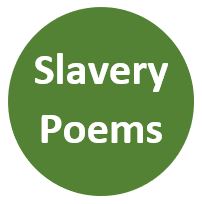Poems about Slavery by William Wordsworth
William Wordsworth
'To Thomas Clarkson. On the Final Passing of the Bill for the Abolition of the Slave Trade' (1807)
CLARKSON! it was an obstinate hill to climb:
How toilsome—nay, how dire—it was, by thee
Is known; by none, perhaps, so feelingly:
But thou, who, starting in thy fervent prime,
Didst first lead forth that enterprise sublime,
Hast heard the constant Voice its charge repeat,
Which, out of thy young heart's oracular seat,
First roused thee.—O true yoke-fellow of Time,
Duty's intrepid liegeman, see, the palm
Is won, and by all Nations shall be worn!
The blood-stained Writing is for ever torn;
And thou henceforth wilt have a good man's calm,
A great man's happiness; thy zeal shall find
Repose at length, firm friend of human kind!
[Top of Page]
William Wordsworth
'To Toussaint L'Overture' (1807)
TOUSSAINT, the most unhappy man of men!
Whether the whistling Rustic tend his plough
Within thy hearing, or thy head be now
Pillowed in some deep dungeon's earless den;—
O miserable Chieftain! where and when
Wilt thou find patience? Yet die not; do thou
Wear rather in thy bonds a cheerful brow:
Though fallen thyself, never to rise again,
Live, and take comfort. Thou hast left behind
Powers that will work for thee; air, earth, and skies;
There's not a breathing of the common wind
That will forget thee; thou hast great allies;
Thy friends are exultations, agonies,
And love, and man's unconquerable mind.
[Top of Page]
William Wordsworth
From The Prelude (1805 Text) Book X, lines 203-228
(1805, 1st published 1926)
When to my native land,
After a whole year's absence, I returned,
I found the air yet busy with the stir
Of a contention which had been raised up
Against the traffickers in Negro blood,
An effort which, though baffled, nevertheless
Had called back old forgotten principles
Dismissed from service, had diffused some truths,
And more of virtuous feeling, through the heart
Of the English people. And no few of those,
So numerous—little less in verity
Than a whole nation crying with one voice—
Who had been crossed in this their just intent
And righteous hope, thereby were well prepared
To let that journey sleep awhile, and join
Whatever other caravan appeared
To travel forward towards Liberty
With more success. For me that strife had ne'er
Fastened on my affections, nor did now
Its unsuccessful issue much excite
My sorrow, having laid this faith to heart,
That if France prospered good men would not long
Pay fruitless worship to humanity,
And this most rotten branch of human shame
(Object, as seemed, of superfluous pains)
Would fall together with its parent tree.
[Top of Page]
William Wordsworth
From The Prelude (1850 Text) Book X, lines 237-265
(1850)
Twice had the trees let fall
Their leaves, as often Winter had put on
His hoary crown, since I had seen the surge
Beat against Albion's shore, since ear of mine
Had caught the accents of my native speech
Upon our native country's sacred ground.
A patriot of the world, how could I glide
Into communion with her sylvan shades,
Erewhile my tuneful haunt? It pleased me more
The general air still busy with the stir
Of that first memorable onset made
By a strong levy of humanity
Upon the traffickers in Negro blood;
Effort which, though defeated, had recalled
To notice old forgotten principles,
And through the nation spread a novel heat
Of virtuous feeling. For myself, I own
That this particular strife had wanted power
To rivet my affections; nor did now
Its unsuccessful issue much excite
My sorrow; for I brought with me the faith
That, if France prospered, good men would not long
Pay fruitless worship to humanity,
And this most rotten branch of human shame,
Object, so seemed it, of superfluous pains
Would fall together with its parent tree.
[Top of Page]







